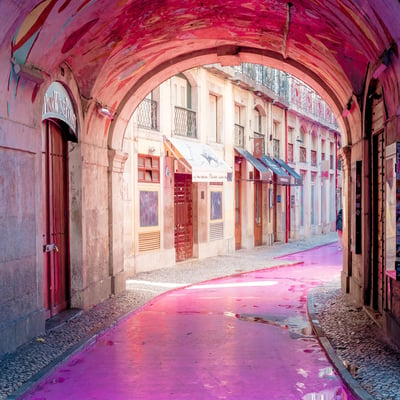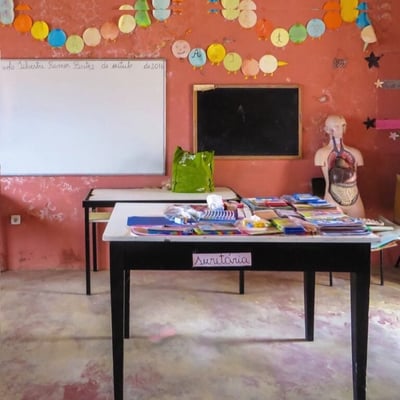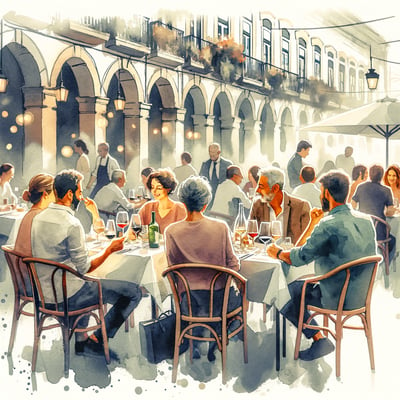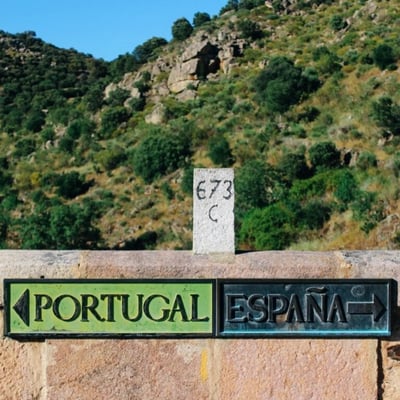1
00:00:02,685 –> 00:00:04,445
Diogo: Tens a certeza que sabes
{{Diogo: Are you sure you know}}
2
00:00:04,545 –> 00:00:05,885
onde fica a discoteca?
{{where the nightclub is?}}
3
00:00:05,885 –> 00:00:06,905
Marco: Tenho.
{{Marco: I’m sure. (I have [certainty])}}
4
00:00:06,905 –> 00:00:10,185
É em frente e depois à esquerda.
{{It’s straight ahead and then to the left.}}
5
00:00:10,345 –> 00:00:12,645
Diogo: Mas estamos a ir em frente
{{Diogo: But we have been going straight ahead}}
6
00:00:12,645 –> 00:00:14,296
há muito tempo e parece que
{{for a long time and it looks like}}
7
00:00:14,305 –> 00:00:16,865
estamos a afastar-nos da cidade.
{{we are moving away from the city.}}
8
00:00:16,865 –> 00:00:17,985
É assim tão longe?
{{Is it that far?}}
9
00:00:18,065 –> 00:00:19,765
Marco: Não, é perto.
{{Marco: No, it is close.}}
10
00:00:19,765 –> 00:00:22,445
Estamos quase lá… Acho eu.
{{We are almost there… I think.}}
11
00:00:22,445 –> 00:00:24,185
Diogo: O meu amigo disse que
{{Diogo: My friend said that}}
12
00:00:24,205 –> 00:00:26,725
tínhamos de passar debaixo de uma ponte antes
{{we had to pass under a bridge before}}
13
00:00:26,725 –> 00:00:28,325
de chegar à discoteca.
{{reaching the club.}}
14
00:00:28,325 –> 00:00:29,965
Eu ainda não vi nenhuma ponte.
{{I have not seen any bridge[s] yet.}}
15
00:00:29,965 –> 00:00:31,645
Marco: Deve ser mais à frente.
{{Marco: It should be further ahead.}}
16
00:00:31,645 –> 00:00:35,025
Diogo: Vou ver no GPS.
{{Diogo: I’ll check the GPS.}}
17
00:00:35,025 –> 00:00:36,685
Eu sabia!
{{I knew it!}}
18
00:00:36,825 –> 00:00:38,785
Temos de voltar para trás.
{{We have to turn back.}}
19
00:00:38,785 –> 00:00:40,985
A discoteca fica na direção oposta.
{{The club is in the opposite direction.}}
20
00:00:40,985 –> 00:00:43,025
Já estamos fora da cidade.
{{We are already out of the city.}}
21
00:00:43,035 –> 00:00:46,215
Marco: Eu tinha a certeza que era por aqui…
{{Marco: I was sure it was around here…}}
22
00:00:46,215 –> 00:00:48,665
Diogo: Tu és demasiado orgulhoso.
{{Diogo: You are too proud.}}
23
00:00:48,665 –> 00:00:51,105
Pelo menos, estamos dentro do carro.
{{At least we are in the car.}}
24
00:00:51,105 –> 00:00:53,485
Não parece seguro andar nesta zona à noite.
{{It doesn’t seem safe to walk in this area at night.}}
25
00:00:53,485 –> 00:00:56,605
Marco: Pois não… Olha, uma rotunda.
{{Marco: Well no… Look, a roundabout.}}
26
00:00:56,605 –> 00:00:58,345
Vou mudar de direção aqui.
{{I am going to change direction here.}}
27
00:00:58,345 –> 00:01:00,085
Diogo: Espera, o semáforo está vermelho.
{{Diogo: Wait, the traffic light is red.}}
28
00:01:00,085 –> 00:01:01,805
Marco: Tens razão, não vi.
{{Marco: You’re right, I didn’t see it.}}
29
00:01:01,805 –> 00:01:02,985
Obrigado.
{{Thank you.}}
30
00:01:02,985 –> 00:01:05,504
A discoteca está muito distante daqui?
{{Is the club really far from here?}}
31
00:01:05,505 –> 00:01:08,145
Diogo: Não, não é assim tão longe.
{{Diogo: No, it’s not that far.}}
32
00:01:08,145 –> 00:01:09,365
Estamos próximos.
{{We are close.}}
33
00:01:09,365 –> 00:01:13,121
E a discoteca está em frente a uma estação de comboio,
{{And the club is in front of a train station,}}
34
00:01:13,121 –> 00:01:15,165
por isso é fácil de encontrar.
{{so it’s easy to find.}}
35
00:01:15,165 –> 00:01:17,525
Marco: OK, então vamos que se faz tarde!
{{Marco: OK, so let’s go before it gets late!}}
 We respect your privacy and have a ZERO TOLERANCE for spam.
We respect your privacy and have a ZERO TOLERANCE for spam.
















I followed my usual listening twice at normal speed, then once at slow speed, then again with the transcript, but I was very wrong in my translation of a large part of the text. For example, I thought the disco was in front of and to the side of a set of stairs, instead of straight ahead and to the left. And I got “demasiado the next word” right on the quiz, while not coming up with the right meaning of either word. And the only word I had gotten that would help me answer one question was the color vermelho. That was enough. I got 7 out of 8 questions right, and would have thought I was doing fine, when actually, I should have totally failed the quiz. I only missed the one on who was driving, which is the type of detail I never notice anyhow so I wouldn’t have been upset that I missed it.
But I also always do one more step. I go back and look at the translation, which is how I discovered how little I had actually understood, even with the transcript. Very glad that I do that. Don’t know why so little of this unit stuck to my brain.
Olá e Feliz Páscoa
How does – OK, então vamos que se faz tarde!
Translate as – OK, so let’s go before it gets late!
“Vamos que se faz tarde” it’s an idiomatic expression that better translates to “let’s go before it gets late” or “let’s go ’cause it’s getting late”.
Feliz Páscoa!
In the lessons, you have “a paragem de autocarro é ao lado da minha casa” (the bus stop is next to my house). Why is it “é” and not “fica” or “estar” since it is a location?
Olá! Actually, when we’re indicating locations, all three verbs (ser, estar, ficar) are generally interchangeable. Any of them would be correct in the sentence you mentioned 🙂
Olá boa tarde! Podia explicar o que é a diferença entre ‘à frente’ e ’em frente’?
Muito obrigada!
Olá! “À frente” e “em frente” são geralmente usados de forma equivalente quando nos referimos a estar diante de alguma coisa (repara que cada expressão é seguida por uma preposição diferente):
Estou à frente da loja. = Estou em frente à loja. (I’m in front of the store)
No entanto, quando estamos a descrever um movimento e não uma posição, só devemos usar ’em frente’:
– Vai em frente (Go straight ahead)
Hello,
Why in the following sentence ‘E a discoteca está em frente a uma estação de comboio’ is ‘a uma’ used, rather than duma? I notice usually when giving location in reference to something ‘de’ is usually used rather than a. Thank you 😊
“Em frente a” is the expression used when saying “in front of”. “A” is the preposition. “De” is used when saying, for example, “ao lado de” (next to), “à direita de” (to the right of), “atrás de” (behind), “Em cima de” (on top of),… 🙂